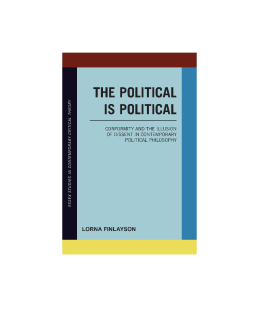
Additional Information
Book Details
Abstract
Nobody should really have to point out that political philosophy is political. Yet in this highly original and provocative book Lorna Finlayson argues that in fact it is necessary to do so. Offering a critique of mainstream liberal political philosophy through close, critical engagement with a series of specific debates and arguments, Finlayson analyzes the way in which apparently neutral methodological devices such as “charitable interpretation” and “constructive criticism” function so as to protect against challenges to the status quo.
At each stage, Finlayson demonstrates that political philosophy is suffering from a complex process of “de-politicization.” Even in cases where it appears that the dominant framework of liberal political philosophy is being strongly challenged—as, for example, in the case of the ‘realist’ critique of “ideal theory”—this book argues that the debate is set up in such a way as to impose strict limits on the kind of dissent that is possible. Only by dragging these hidden presuppositions into the foreground can we arrive at a clear-eyed appreciation of such debates, and perhaps look beyond the artificially constricted landscape in which they seek to confine us.
Experimentation with the institutions and practices of philosophy, as [Finlayson] suggests, may encourage greater reflexive awareness of the operations of power within the disciplinary community, and also enable us to address more insightfully the question of what kind of society of philosophers, as well as society more generally, we should aspire to build ... my final sense of this work is that its underlying motivation is perhaps as much philosophical as political, a plea for thoughtfulness against the academic currents of the age.
[W]ithout fail, the book is intellectually robust, pungently argued, and thought provoking. It succeeds admirably in one of its main self-declared objectives in simply being more fun to read than the vast majority of books in political philosophy.
[Finlayson’s] dexterity in unmasking the internal contradictions of a discipline which, as she shows, is so loath to acknowledge even the existence of ‘deep dissent’ much less its validity, is […] what is distinctive about this book.
This highly original work offers a novel and exceedingly persuasive approach to contemporary politics, political theory and political philosophy. It is unusual for a book of such great analytic power to be written in a style so easily accessible and engaging; it is at the same time enlightening and a pleasure to read.
Raymond Geuss, Emeritus Professor, University of Cambridge.
This is a bold and impressively coherent critique of the dominant paradigm in analytical political philosophy. It challenges decisively the claim that Rawls’s criterion of reasonableness can apply to the human world as it is and be acceptable in the way it needs to be to very many of the latter’s inhabitants.
John Dunn, Fellow of King's College & Emeritus Professor of Political Theory, University of Cambridge
Lorna Finlayson is a junior research fellow at King’s College, University of Cambridge.
Finlayson, who has particular interests in theories of ideology, offers a book on the illusion of dissent in contemporary political philosophy, and more particularly in the Anglo-Saxon world. The author looks at political philosophy as a human institution, which at the same time bears traces of the social world it is embedded in and constructs the world readers live in. She claims that contemporary political philosophy deploys methodological norms that covertly maintain the dominance of the liberal framework. In doing that, this discipline becomes political inside and out. This covert methodological trap is revealed through six case studies. Three of them deal with specific concepts from John Rawls that define legitimate dissent out of existence. The remaining cases deal with feminist challenges to the traditional liberal attitude toward pornography, realist critique of liberal normative theory, and an effort among philosophers to engage in self-reflection and to give an account to their place in the world. The author claims that the liberal political philosophy, in its dominant mode, neither helps transform the world for the better nor helps it be understood better. Summing Up: Recommended. Upper-division undergraduate, graduate, and research collections.
